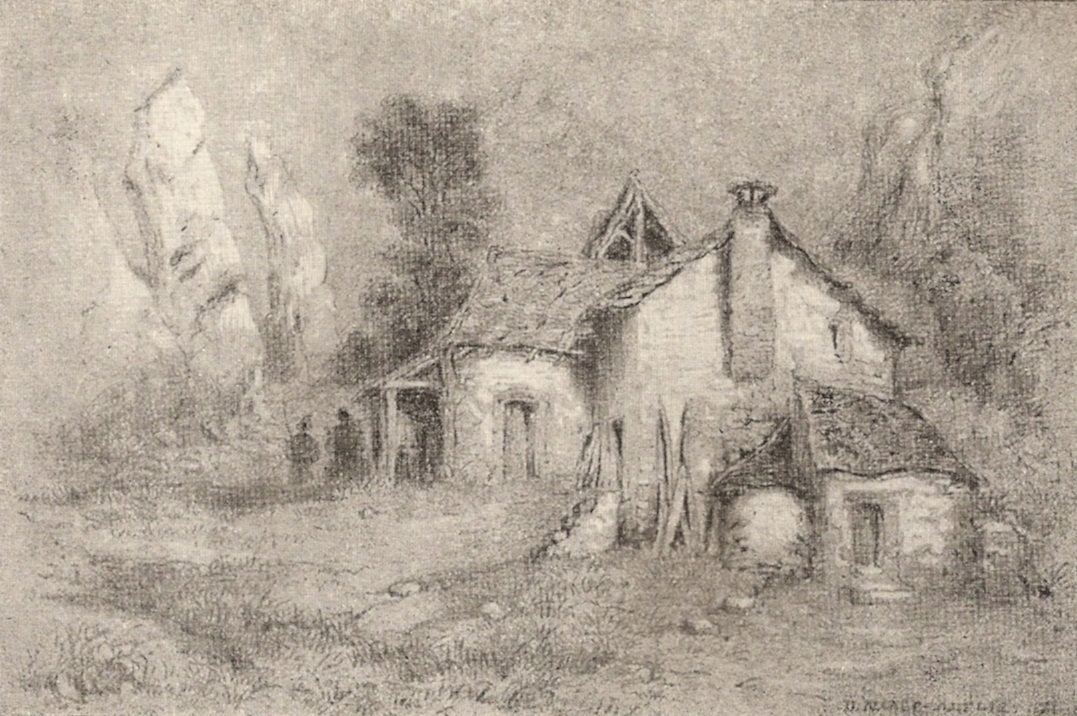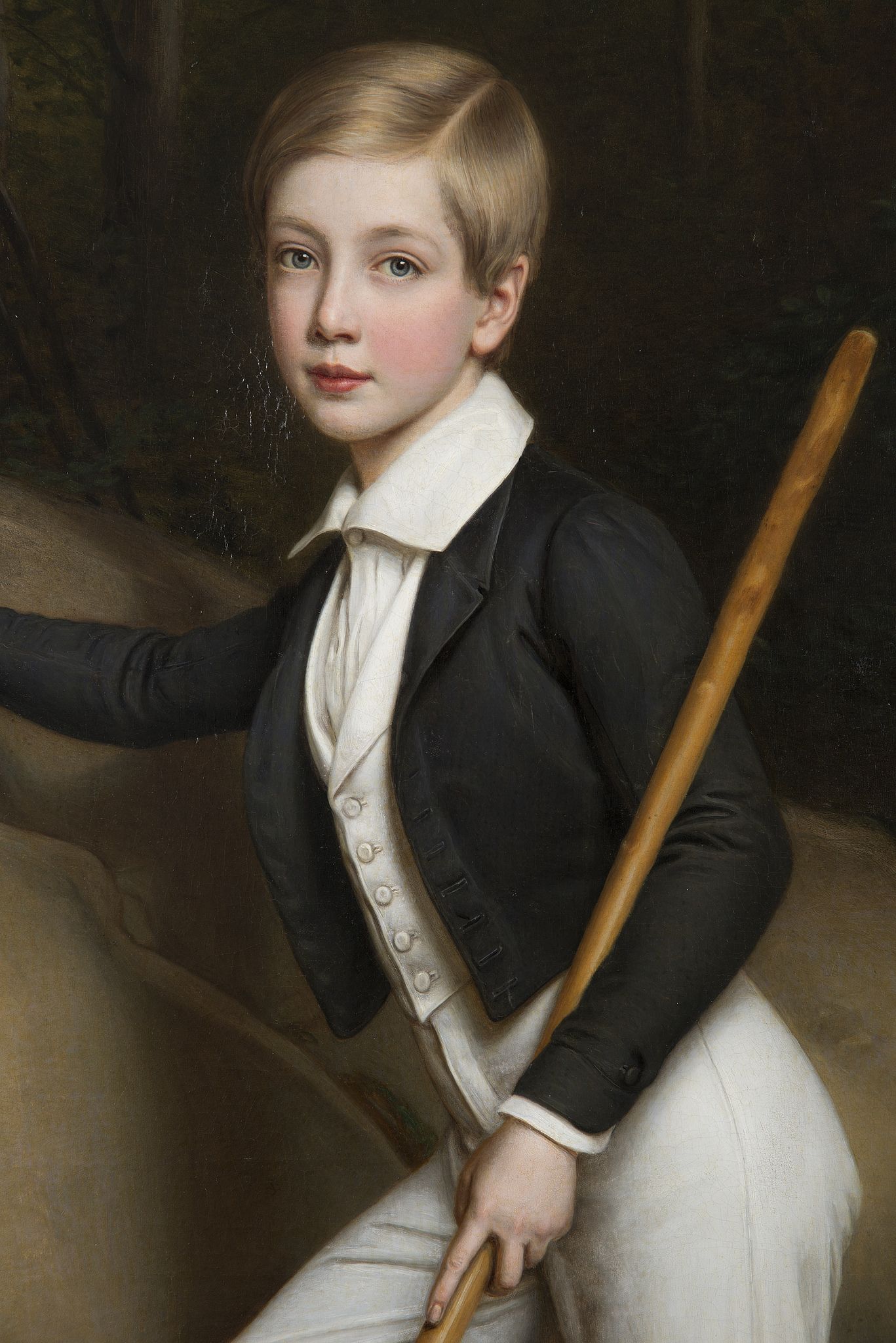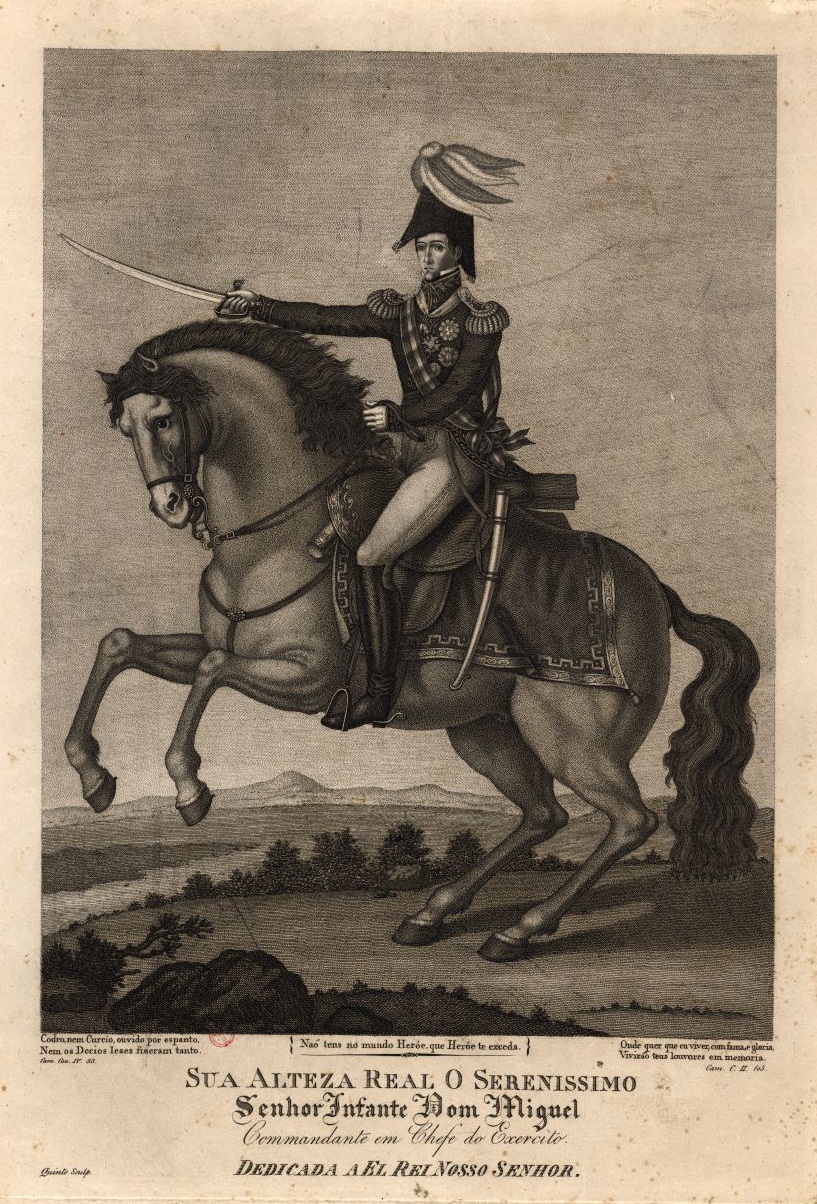|
Princess Maria Amélia Of Brazil
Dom (title), Dona Maria Amélia (1 December 1831 – 4 February 1853) was a princess of the Empire of Brazil and a member of the Brazilian branch of the House of Braganza. Her parents were Emperor Dom (title), Dom Pedro I of Brazil, Pedro I, the first ruler of Brazil, and Amélie of Leuchtenberg. The only child of her father's second marriage, Maria Amélia was born in July Monarchy, France after Pedro I abdicated the Brazilian throne in favor of his son Dom Pedro II of Brazil, Pedro II. Before Maria Amélia was a month old, Pedro I went to Portugal to restore the crown of the eldest daughter of his first marriage, Dona Maria II of Portugal, Maria II. He fought a successful war against his brother Miguel of Portugal, Miguel I, who had usurped Maria II's throne. Only a few months after his victory, Pedro I died from tuberculosis. Maria Amélia's mother took her to Portugal, where she remained for most of her life without ever visiting Brazil ... [...More Info...] [...Related Items...] OR: [Wikipedia] [Google] [Baidu] |
Dom (title)
The terms Don (in Spanish and Italian), Dom (in Portuguese), and Domn (in Romanian), are honorific prefixes derived from the Latin ''Dominus'', meaning "lord" or "owner". The honorific is commonly used in Spain, Portugal, and Italy, as well as in the Spanish-speaking world and Portuguese-speaking world, as well as some other places formerly colonized by Spain or Portugal. The feminine equivalents are (), (), (Romanian) and (). The term is derived from the Latin : a master of a household, a title with background from the Roman Republic in classical antiquity. With the abbreviated form having emerged as such in the Middle Ages, traditionally it is reserved for Catholic clergy and nobles, in addition to certain educational authorities and persons of high distinction. Spanish-speaking world In Spanish, although originally a title reserved for royalty, select nobles, and church hierarchs, it is now often used as a mark of esteem for an individual of personal, social o ... [...More Info...] [...Related Items...] OR: [Wikipedia] [Google] [Baidu] |
Archduke Maximilian Of Austria
Maximilian I (; ; 6 July 1832 – 19 June 1867) was an Austrian archduke who became emperor of the Second Mexican Empire from 10 April 1864 until his execution by the Mexican Republic on 19 June 1867. A member of the House of Habsburg-Lorraine, Maximilian was the younger brother of Emperor Franz Joseph I of Austria. Before becoming Emperor of Mexico, he was commander-in-chief of the small Imperial Austrian Navy and briefly the Austrian viceroy of Lombardy–Venetia, but was removed by the emperor. Two years before his dismissal, he briefly met with French emperor Napoleon III in Paris, where he was approached by conservative Mexican monarchists seeking a European royal to rule Mexico. Initially Maximilian was not interested, but following his dismissal as viceroy, the Mexican monarchists' plan was far more appealing to him. Since Maximilian was a descendant of Charles V, Holy Roman Emperor, King of Spain when the Spaniards conquered the Aztecs (1519–21) and first brought Mex ... [...More Info...] [...Related Items...] OR: [Wikipedia] [Google] [Baidu] |
Miguel I
'' Dom'' Miguel I (26 October 1802 – 14 November 1866), known by several nicknames, was the King of Portugal between 1828 and 1834. He was son of King John VI and Queen Carlota Joaquina. Following his exile as a result of his actions in support of absolutism in the April Revolt (Abrilada) of 1824, Miguel returned to Portugal in 1828 as regent and fiancé of his niece Queen Maria II. As regent, he claimed the Portuguese throne in his own right, since according to the so-called Fundamental Laws of the Kingdom his older brother Pedro IV and therefore the latter's daughter had lost their rights from the moment that Pedro had made war on Portugal and become the sovereign of a foreign state (Brazilian Empire). This led to a difficult political situation, during which many people were killed, imprisoned, persecuted or sent into exile, and which culminated in the Portuguese Liberal Wars between authoritarian absolutists and progressive constitutionalists. In the end Miguel ... [...More Info...] [...Related Items...] OR: [Wikipedia] [Google] [Baidu] |
Maria Leopoldina Of Austria
Don (honorific), Dona Maria Leopoldina of Austria (22 January 1797 – 11 December 1826) was the first Empress of Brazil as the wife of Emperor Dom (title), Dom Pedro I of Brazil, Pedro I from 12 October 1822 until her death. She was also List of Portuguese royal consorts, Queen of Portugal during her husband's brief reign as King Dom Pedro IV from 10 March to 2 May 1826. She was born in Vienna, Austria, the daughter of Holy Roman Emperor Francis II, Holy Roman Emperor, Francis II, and his second wife, Maria Theresa of Naples and Sicily. Among her many siblings were Emperor Ferdinand I of Austria and Marie Louise, Duchess of Parma, the wife of Napoleon Bonaparte. The education Maria Leopoldina had received in childhood and adolescence was broad and eclectic, with a higher cultural level and more consistent political training. Such education of the little princes and princesses of the Habsburg family was based on the educational belief initiated by their grandfath ... [...More Info...] [...Related Items...] OR: [Wikipedia] [Google] [Baidu] |
Maria II
Don (honorific), Dona Maria II (Maria da Glória Joana Carlota Leopoldina da Cruz Francisca Xavier de Paula Isidora Micaela Gabriela Rafaela Gonzaga de Habsburgo-Lorena e Bragança; 4 April 1819 – 15 November 1853) also known as "the Educator" () or as "the Good Mother" (), was Queen of Portugal from 1826 to 1828, and again from 1834 to 1853. Her supporters considered her to be the rightful queen also during the period between her two reigns. Maria was born in Rio de Janeiro during the reign of her paternal grandfather, King Dom João VI. She was the first child of the Duke and Duchess of Braganza, who later became Emperor Dom Pedro I of Brazil, Pedro I and Empress Dona Maria Leopoldina of Brazil. In 1826, her father became king of Portugal but quickly abdicated in favour of the seven-year-old Maria. Both Pedro and Maria remained in Brazil, and her aunt Dona Infanta Isabel Maria of Portugal, Isabel Maria initially served as regent for them in Portugal. Later Emperor Ped ... [...More Info...] [...Related Items...] OR: [Wikipedia] [Google] [Baidu] |
King Maximilian I Of Bavaria
Maximilian I Joseph (; 27 May 1756 – 13 October 1825) was Duke of Zweibrücken from 1795 to 1799, prince-elector of Bavaria (as Maximilian IV Joseph) from 1799 to 1806, then King of Bavaria (as Maximilian I Joseph) from 1806 to 1825. He was a member of the House of Palatinate-Birkenfeld-Zweibrücken, a branch of the House of Wittelsbach. Early life Maximilian, the son of the Count Palatine Frederick Michael of Zweibrücken-Birkenfeld and Maria Francisca of Sulzbach, was born on 27 May 1756 at Schwetzingen, between Heidelberg and Mannheim. After the death of his father of testicular cancer in 1767, he was left at first without parental supervision, since his mother had been banished from her husband's court after giving birth to a son fathered by an actor. Maximilian was carefully educated under the supervision of his uncle, Duke Christian IV of Zweibrücken, who settled him in the Hôtel des Deux-Ponts. He became Count of Rappoltstein in 1776 and took service in 1777 as a co ... [...More Info...] [...Related Items...] OR: [Wikipedia] [Google] [Baidu] |
Princess Augusta Of Bavaria
Princess Augusta of Bavaria, Duchess of Leuchtenberg () (21 June 1788 in Munich – 13 May 1851 in Strasbourg) was the second child and eldest daughter of Maximilian I Joseph of Bavaria and Princess Augusta Wilhelmine of Hesse-Darmstadt. By marriage, she was a French princess and vicereine of Italy. She was the aunt of Empress Elisabeth of Austria and, by marriage, of Emperor Napoleon III. Early life Augusta Amalia of Bavaria was the eldest daughter of Maximilian I Joseph of Bavaria and Princess Augusta Wilhelmina of Hesse-Darmstadt. In 1795, upon the death of her uncle, her father Maximilian became the reigning duke of Zweibrücken, but the troops of the young First French Republic occupied his States. Augusta lost her mother to tuberculosis in 1796; a year later, her father married the young Caroline of Baden, who imposed a seriousness on her husband's court that some considered beneficial. At first, Augusta did not like her stepmother, unlike her younger siblings ... [...More Info...] [...Related Items...] OR: [Wikipedia] [Google] [Baidu] |
Napoleon Bonaparte
Napoleon Bonaparte (born Napoleone di Buonaparte; 15 August 1769 – 5 May 1821), later known by his regnal name Napoleon I, was a French general and statesman who rose to prominence during the French Revolution and led Military career of Napoleon, a series of military campaigns across Europe during the French Revolutionary and Napoleonic Wars from 1796 to 1815. He led the French First Republic, French Republic as French Consulate, First Consul from 1799 to 1804, then ruled the First French Empire, French Empire as Emperor of the French from 1804 to 1814, and briefly again in 1815. He was King of Italy, King of Kingdom of Italy (Napoleonic), Italy from 1805 to 1814 and Protector of the Confederation of the Rhine, Protector of the Confederation of the Rhine from 1806 to 1813. Born on the island of Corsica to a family of Italian origin, Napoleon moved to mainland France in 1779 and was commissioned as an officer in the French Royal Army in 1785. He supported the French Rev ... [...More Info...] [...Related Items...] OR: [Wikipedia] [Google] [Baidu] |
Eugène De Beauharnais
Eugène Rose de Beauharnais (; 3 September 1781 – 21 February 1824) was a French statesman and military officer who served in the French Revolutionary and Napoleonic Wars. Through the second marriage of his mother, Joséphine de Beauharnais, he was the stepson of Napoleon Bonaparte. Under the First French Empire, French Empire he also became Napoleon's adopted son (but not the heir to the imperial throne). He was Viceroy of the Kingdom of Italy (Napoleonic), Kingdom of Italy under his stepfather, from 1805 to 1814, and commanded the Army of Italy (France), Army of Italy during the Napoleonic Wars. Historians consider him one of Napoleon's most able relatives. Family Eugène Rose de Beauharnais was born in Paris on 3 September 1781 as the son of Viscount Alexandre de Beauharnais and Marie-Josèphe Rose Tascher de la Pagerie (future empress Josephine), both born in the French colony of Martinique. His parents separated when Eugène was three years old. At the age of five, Eug� ... [...More Info...] [...Related Items...] OR: [Wikipedia] [Google] [Baidu] |
King João VI
''Dom (title), Dom'' John VI (; 13 May 1767 – 10 March 1826), known as "the Clement" (), was King of the United Kingdom of Portugal, Brazil and the Algarves from 1816 to 1825, and after the Treaty of Rio de Janeiro of 1825, recognition of Brazil's independence, titular Emperor of Brazil and List of Portuguese monarchs, King of Portugal until his death in 1826. John VI was born in Lisbon during the reign of his maternal grandfather, King Dom Joseph I of Portugal. He was the second son of the Princess of Brazil and Infante Peter of Portugal, who later became Queen Dona Maria I and King Dom Peter III of Portugal, Peter III. In 1785, John married Carlota Joaquina of Spain, with whom he had nine children. He became heir to the throne when his older brother, José, Prince of Brazil, Prince José, died of smallpox in 1788. Before his accession to the throne, John bore the titles Duke of Braganza, Duke of Beja, and Prince of Brazil. From 1799, he served as prince regent due to ... [...More Info...] [...Related Items...] OR: [Wikipedia] [Google] [Baidu] |
Lady
''Lady'' is a term for a woman who behaves in a polite way. Once used to describe only women of a high social class or status, the female counterpart of lord, now it may refer to any adult woman, as gentleman can be used for men. "Lady" is also a formal title in the United Kingdom. "Lady" is used before the family name or peerage of a woman with a title of nobility or honorary title '' suo jure'' (in her own right), such as female members of the Order of the Garter and Order of the Thistle, or the wife of a lord, a baronet, Scottish feudal baron, laird, or a knight, and also before the first name of the daughter of a duke, marquess, or earl. Etymology The word comes from Old English '; the first part of the word is a mutated form of ', "loaf, bread", also seen in the corresponding ', "lord". The second part is usually taken to be from the root ''dig-'', "to knead", seen also in dough; the sense development from bread-kneader, or bread-maker, or bread-shaper, to the ordina ... [...More Info...] [...Related Items...] OR: [Wikipedia] [Google] [Baidu] |
Infant Baptism
Infant baptism, also known as christening or paedobaptism, is a Christian sacramental practice of Baptism, baptizing infants and young children. Such practice is done in the Catholic Church, the Eastern Orthodox and Oriental Orthodox churches, various Protestant denominations, and also in other denominations of Christianity.Brasher, B. (Ed.). (2001). ''Encyclopedia of fundamentalism: Volume 3 of religion & society'' (p. 47). Berkshire Publishing Group. The practice involves baptizing infants born to believing parents as a means of initiating them into the Christian faith. Supporters of infant baptism cite biblical references to the baptism of entire households in the New Testament, as well as Jesus’ teachings on welcoming children, as justification for this approach. In contrast, Believer's baptism, believers' baptism (credobaptism) is based on the premise that baptism should be administered only to individuals who can personally profess their faith. Those who support this view ... [...More Info...] [...Related Items...] OR: [Wikipedia] [Google] [Baidu] |









